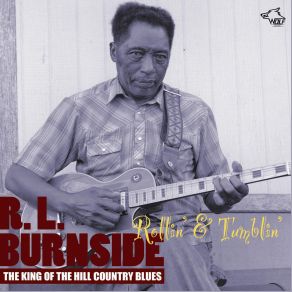Rollin' & Tumblin'
Download links and information about Rollin' & Tumblin' by R. L. Burnside. This album was released in 2010 and it belongs to Blues, Country genres. It contains 19 tracks with total duration of 01:03:54 minutes.

|
|
|---|---|
| Artist: | R. L. Burnside |
| Release date: | 2010 |
| Genre: | Blues, Country |
| Tracks: | 19 |
| Duration: | 01:03:54 |
| Buy it NOW at: | |
| Buy on iTunes $9.99 | |
| Buy on Amazon $0.99 | |
| Buy on Amazon $0.99 | |
| Buy on Amazon $7.49 | |
Tracks
[Edit]| No. | Title | Length |
|---|---|---|
| 1. | Fireman Ring The Bell | 3:48 |
| 2. | Long Haired Doney T1 | 3:37 |
| 3. | Walkin' Blues | 3:43 |
| 4. | Poor Black Mattie T1 (Acoustic) | 3:03 |
| 5. | See My Jumper Hangin' On The Line | 2:51 |
| 6. | Goin' Down South | 4:23 |
| 7. | Poor Boy | 3:32 |
| 8. | Skinny Woman | 2:19 |
| 9. | Bad Luck | 3:36 |
| 10. | Poor Black Mattie T2 (Electric) | 3:06 |
| 11. | 44 Pistols | 3:20 |
| 12. | See My Jumper Hangin' On The Line (Recorded 1991) | 3:14 |
| 13. | Rollin' & Tumblin' | 2:59 |
| 14. | Long Haired Doney T2 | 3:39 |
| 15. | When My First Wife Left Me T1 | 3:26 |
| 16. | Poor Black Mattie T3 | 2:58 |
| 17. | I Be Troubled | 3:44 |
| 18. | When My First Wife Left Me T2 | 4:04 |
| 19. | Boogie Chillen | 2:32 |
Details
[Edit]R.L. Burnside, along with Junior Kimbrough, became the public face of the so-called North Mississippi hill country style of modal blues in the 1980s with several solid albums on the Fat Possum label, and while he tried on different hats during his run (even tracking a fine album backed by indie rocker Jon Spencer and his band), the blues he made essentially stayed in the same pocket, honed from years of playing weekend house parties and juke joints. His droning style, the style that all of the North Mississippi players used, was equal parts John Lee Hooker and Fred McDowell, designed to keep the beat steady for dancing and allowing minimal but effective interplay between voice and guitar, and it was as old as those hills themselves, somehow sounding both ancient and oddly contemporary all at once. This set, drawn from intimate recordings done in 1975, 1989, and 1991, features Burnside playing mostly solo — both acoustic and electric — in living rooms, on porches, and in jukes, and it provides a nicely sequenced portrait of this intriguing musician working away from a studio setting, not that what he did in the studios differed one degree from what he did outside of them. Highlights include two takes of “Long Haired Doney,” three of the signature “Poor Black Mattie” (both acoustic and electric), an endearing and intimate version of “Goin’ Down South,” and a solid take on Hooker's “Boogie Chillen” that shows how large a role Hooker played in the creation of the hill country sound and style.